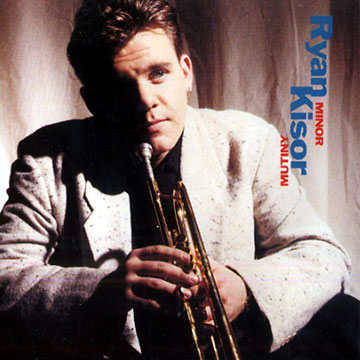The cover, which apes Chet Baker, first grabbed me. I saw a young guy, similar features, sport coat, trumpet, and dramatic lighting. I thought, okay, let's try this out. The second thing, first hearing then reading, was the personnel including Ravi Coltrane, Lonnie Plaxico, Michael Cain, and either Jeff Siegel or producer Jack DeJohnette on drums. It's a sweet debut, a sort of double debut if you count Siegel. I was immediately swept up by the beautifully lonesome "One For Miles," which evokes Davis' "Basin Street Blues" from Seven Steps to Heaven. Kisor pays through the mute and it's a spot on, glowing tribute. My reaction was, "If this guy doesn't sound like Miles!" Yet in spite of Kisor's obvious reverence for the master, the performance isn't cliche and the style is all his own. Then there's the work by Ravi Coltrane on tenor and soprano. His tone and intonation on soprano are exemplary and the choruses take possibly the most unique voice in the group. Juxtaposition of drummers Siegel and DeJohnette do not ruin the continuity. Siegel is fantastic, playing responsively in intricate patterns all around the beat, and doesn't suffer for following an experienced musician like DeJohnette. You'll find that Siegel's playing even starts the melancholy album (there is some great mood on this disc), and he is only supplanted by DeJohnette on two tracks.
Recent listening, current
Archived listening, 2013-2016
Showing posts with label jack dejohnette. Show all posts
Showing posts with label jack dejohnette. Show all posts
Sunday, September 8, 2013
Tuesday, January 29, 2013
19. Joe Henderson / Power to the People (1969)
Power to the People implicates Henderson in the new jazz of the late sixties, and in hindsight, speaks for his versatility in different forms of jazz. It's also very accessible and easy to enjoy. Overall I think it's successful, and it holds up to a lot of repeat listening. The band is Henderson, Jack DeJohnette, Herbie Hancock, Mike Lawrence, and Ron Carter. These are certainly players who are capable of stretching out and pushing themselves into new areas. Henderson's playing is clean and lyrical, boldly assertive and individualistic. The ponderous "Black Narcissus" meanders like a dreamy tone poem. I lose the musicality a little bit in the suite on Side 2, but appreciate the passion Henderson puts into it. Herbie Hancock is also notable here, being the first electric instrument on a Henderson album. He is nearly isolated in the left channel, and his interplay is stimulating.
Subscribe to:
Posts (Atom)

